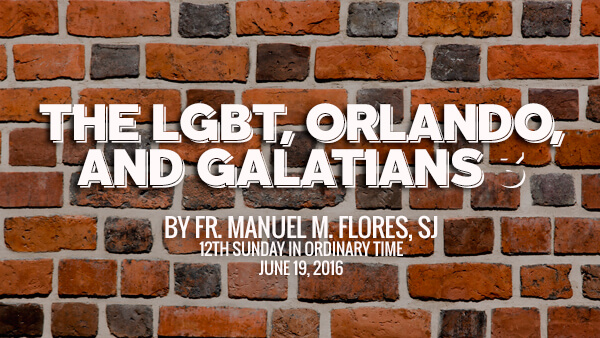


Fr. Manuel M. Flores, SJ
12th Sunday in Ordinary Time
June 19, 2016
The world divided by the walls of prejudice and hate
How did you feel when you first heard the news about the massacre in the gay nightclub in Orlando Florida? This is the greatest mass shooting ever in US history where 50 people died and 53 were injured.
We have heard about the almost ritual, politically correct expressions of outrage and horror received from leaders around the world. But it’s good to ask about our own personal feeling about that event. How do you feel about that mass shooting of gays?
Immediately after the incident, a macho guy discussed the killings with me. He speculated that the killer must have had some very negative experiences with gay people that severely provoked him. He somehow implied that the gays were ultimately at fault.
To my great shame, I spontaneously agreed with him. Only later did I become remorsefully aware of my latent prejudice. I am not the fair, merciful and accepting person I thought I was.
And we find many homophobic, hate-filled reactions emerging in social media some of which are the following:
From Twitter:
“Florida Pulse gay club attacked. I’m so happy someone decided to start shooting perverts instead of innocent people.”
“The only good thing about the Orlando shooting is that it was a gay club. So less gays in the world today”
“God opened His armory to deal with proud fag america. 20 dead in mass shooting at Orlando “gay” nightclub”
From Facebook:
“OK… At least it was only gays. Not like they add anything to mankind: Except disease – a bit of a non – story really”
“Gay night club?? Just disgusting and I think that gunman done a good job”
“That is the right target for such shootings. Gays should be shot for disrespecting the natural order.”
On this Jubilee of Mercy we may have a tool here for measuring our capacity for mercy. This is by asking two practical questions: 1) How sad am I about the massacre of gays in Orlando? 2) Or, how happy am I that “they got what they deserved.”
Jesus vision: that all may be one
In the Jewish morning prayer, which Paul must all his pre-Christian life have used, the Jew thanks God that “Thou hast not\ made me a Gentile, a slave or a woman.”
Paul takes that prayer and reverses it. The old distinctions were gone; all were one in Christ.
In today’s second reading from Galatians 3:27-28 Paul declares “For all of you who were baptized into Christ have clothed yourselves with Christ. There is neither Jew nor Greek, there is neither slave nor free person, there is not male and female; for you are all one in Christ Jesus.”
What does this mean?
Paul is saying that to be baptized in Christ means to have God’s vision that breaks down all walls and barriers that divide humanity.
Racial and religious walls fall: “there is neither Jew nor Greek (white nor black, Muslim nor Buddhist)”
Social and economic walls fall: “there is neither slave nor free person (rich nor poor, capitalist nor laborer)”
Gender walls fall: “there is not male and female (lesbian nor gay, bi-sexual nor transgender)”
All these walls and barriers are submerged in “the ocean of God’s love, wisdom, blessings and joy” (from the vision of St Margaret Mary Alacocque, visionary of the Sacred Heart).
The Christian never denies that these distinctions exist; he is too deeply grounded in reality to deny them. The Christian however recognizes that these are superficial differences compared to the glorious plan of God who desires “to unite all things in Christ, in the heavens and on the earth.” (Ephesians 1:11)
More than any pope in history, Pope Francis in so short a time has done so much to overcome gender prejudice and hatred without compromising Catholic faith and morals. Much of this is by his spontaneous love that overcomes racial, social, economic and gender barriers.
This is also the purpose of the Eucharist that Jesus specifically prayed for during the Last Supper: “May they all be one as you, Father, are in me and I am in you” (John 17:21)
We share and commit ourselves to God’s vision everytime we participate in the Eucharist.
In the shadow of Orlando, and knowing Jesus’ vision of united humanity we must ask:
What have I done for Christ?
What am I doing for Christ?
What will I do for Christ?